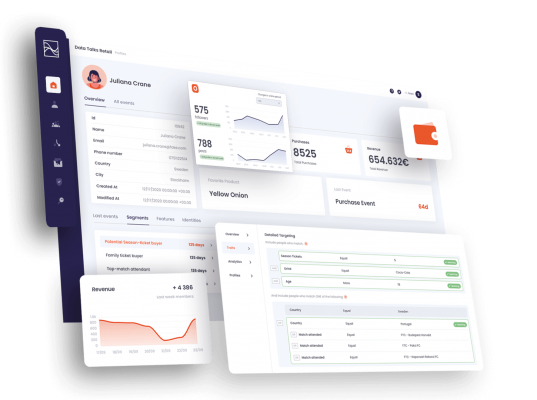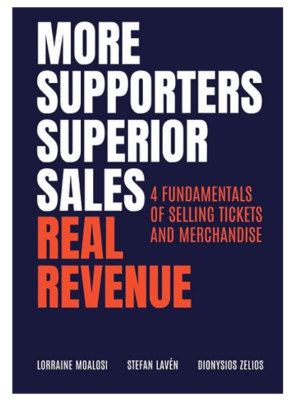
You read the headline right. The event tickets market is worth $85.07B! However, did you know that the market “is expected to exhibit an annual growth rate (CAGR 2024-2028) of 2.54%, resulting in a projected market volume of US$94.06bn by 2028″? Of this total, do you know how much revenue the sports events market is anticipated to generate this year? $33.77B. Simply put, this means that the sale of tickets for professional sporting events purchased via the Internet will generate just under 40% of all revenue in the event tickets market. And why is this important information for sports organisations to know? Let’s discuss all this and how sports organisations should leverage this in this blog post.
Before we dive right in...
Subscribe to our blog today to ensure that you never miss valuable posts such as this one. We are passionate about helping sports organizations deliver a world-class fan experience, because better fan experience means better business. So why not use this opportunity to the fullest?

Why do sports organisations NEED to know that the event tickets market is worth $85.07B
Consumers always express their interest in something by how much they are willing to spend on it. Sports fans are no exception. According to the same Statista report, the average revenue per user (ARPU) is expected to be $110.90. For clubs playing in the highest leagues, this amount does not come as a shock. In 2023, for example, Chelsea boasted the most expensive tickets in the Premier League at £240. Meanwhile, a peak on the other side of the Atlantic shows that the average cost of an NFL ticket has been rising steadily every year from $62.38 in 2006 to $111.75 in 2022.
For clubs and leagues that are: 1) second division or lower, 2) less popular sports, 3) are in countries with lower disposable incomes, or 4) women’s sports, the numbers might be different. That is why ALL sports organisations need to understand the revenue potential of the event tickets market. So that they too can know that is possible for them to create substantial revenue from selling tickets. Not only that but they can do it sustainably.
Whichever side of the equation your sports organisation finds itself in, we will address what you can do today for your sports organisation to increase its revenue.
For sports organisations at the very top of the pyramid
With Premier League clubs like West Ham having a 99.9% attendance, what else could there be left to do to “improve” ticketing? What about the NFL? They had an average regular-season home game attendance of almost 70 thousand fans during the 2022-23 season. Let’s explore a few scenarios that sports organisations at the very top of the pyramid can focus on to improve their approach to ticketing.
Outpricing fans
Are clubs and other rights holders, especially those at the very top, outpricing fans? The answer to this question depends on who you ask. According to Everything F1, “66% of fans think it is too expensive to be a Formula 1 fan in 2023” while 99% of fans say they will never attend a Formula 1 race. Maybe Formula 1 is the exception? Not really. Fulham Supporters Trust launched the Campaign For Fair Pricing with the social media hashtag #AffordableFulham after Fulham announced planned price hikes ranging between 18% and 225%.
In Canada, last year, “the cheapest available tickets to see the Leafs play in Toronto at the Scotiabank Arena were about $386 for standing above the highest seat level at the arena. A ticket for a seat starts at $500, but the view is obstructed. In the 300 levels, a ticket is going for $600, and closer to the ice all tickets are going for more than $1,000 each”, CTV’s Your Morning reported. Looking at this information, one might say yes – rights holders are outpricing fans.
However, some clubs have argued that they are trying to balance the needs and preferences of different types of fans, including those who watch the game online or on TV, and those who attend the games in person. So, no. Clubs are not outpricing fans.
Understanding fans’ buying behaviour
No matter the answer to the above question, “are clubs/rights holders outpricing fans”, the fact that fans are complaining calls for a reevaluation. Of course, some clubs and rights holders have put some measures to increase the affordability and accessibility of games. These include discounts, subsidies, loyalty schemes, and flexible payment plans. This is all excellent. However, the question arises, “how are clubs ensuring that they are sending the right offers to the right supporters”? How are clubs ensuring that affordable tickets are reaching the fans who desperately want them? Moreover, how are clubs ensuring that the pricier tickets are only sent to the segment of supporters who can afford them?
Understanding fans’ buying behaviour is crucial in this scenario. In the article, The Future of Sports Ticketing: Technologies, Data, and New Strategies, Yilmaz and his co-researchers write that “the growth rate of ticket revenues has trailed other revenue streams such as media rights and sponsorships” because of:

limited success of analytics in the ticketing domain

very few sports organisations have the right data and analytics strategies in place to deliver better business results

imperfect integration of their systems

organizations struggle to accurately process data and therefore limit themselves to mostly descriptive analytics
Indeed, this has been a sentiment shared by most of the sports organisations we have worked with. That’s why we crafted the 4 fundamentals of selling tickets. Because of this, sports organisations have been able to double the average purchase value of their supporters without alienating any of their supporters. The secret to the success? Understanding fans’ buying behaviour.
The 4 fundamentals of selling tickets
The 4 fundamentals method is a groundbreaking process innovation crafted by Data Talks. This transformative approach empowers sports organizations of all sizes, across seasons and regions, to harness the power of their data. By seamlessly integrating all supporter data into one place, the result is not just increased sustained revenue streams, but a genuine commitment to placing fans and supporters at the heart and centre of every initiative.
The 4 fundamentals are:

Grow your contact database, continuously

Collect supporter data with contact information and merge it with your other data

Find out which supporter segments you should target with your campaigns

Send relevant offers to those segments in a way that your supporters will appreciate
By using this method, sports organisations at the very top can fully understand their supporters and know which offers to send to their different segments and solve all the problems identified by Yilmaz and his co-authors. The Data Talks Sports Platform powers the framework.
Success story
A top-flight football club in Europe wanted to increase their ticket revenue so they enlisted our help. Equipped with the 4 Fundamentals of selling tickets and powered by the Data Talks Sports Platform, the club:
- Started by creating specific segmentation that focused on returning supporters so they could receive a campaign for the upcoming match
- They created this campaign approximately 5-7 days before kick-off, which created the opportunity for the club to send out a reminder campaign to everybody who had opened the campaign but not completed the purchase
- The segment that the club had created, returning supporters who were interested in the upcoming game, was given the opportunity to upgrade their seats
The results?
- When creating the campaigns and the specific segment, the club managed to increase the average revenue on ticketing to €42.02
- The club had been on an average of €19.42 on ticketing revenue for the precious season before this campaign.
- So the club managed to increase their average ticket revenue by almost 116.35%.

To see how this would look in action, explore the Data Talks CDP demo >>
The majority of sports organisations
The majority of sports organisations aren’t in the highest leagues but they are crucial to their supporters and the overall health of the entire sports ecosystem nonetheless. So when the event tickets market is worth $85.07B and seemingly going to the clubs at the very top, how can the majority of sports organisations increase their ticketing revenue? Once again, the answer lies in using the 4 fundamentals method.
Beyond helping sports organisations understand their fans’ buying behaviour: the 4 fundamentals help sports organisations:
Include all of their supporters
By growing your supporter contact base continuously, you ensure that even that fan who bought a ticket three years ago is seen. That way, you can incentivise even more engagement from them by using tactics such as gamification to encourage them to attend more matches.
You can understand fully all your supporters’ interactions with your organisation
By collecting supporter data with contact information and merging it with your other data such as sales data and consumption data, you will understand fully, how your supporters interact with your sports organisation. For example, do your supporters mainly buy single tickets but never merchandise or food and beverages during match days? Or do your supporters buy season tickets once and never renew? You can understand fully what supporters are doing. Maybe during matchday supporters never interact with your sponsors’ activations. You won’t know until you work with this fundamental.
Target the right fans
Before sending out any ticketing campaign, it is important to know which supporter segments you should target with your ticketing offers. Like with clubs at the very top of the leagues, you want affordable tickets to go to the right segment and the more expensive tickets to the right segment. Here are a few examples of fan segments you can target with your various ticketing campaigns:
- High spenders
- Low to medium-spenders
- Families
- Single ticket buyers
- Season ticket holders
- VIP Supporters
- Potential churners – those who haven’t made any purchases in a long time
- Supporters in need of accessibility assistance
- Ultra supporters – those who are huge fanatics, tend to be younger
By working with your various supporter segments you ensure that none of your fans feel alienated.
Increase fan satisfaction
You want to send out your ticketing offers in a way that your supporters will appreciate. In the same ways that clubs at the very top of the pyramid can risk outpricing fans, if they don’t know which segments they belong to, you don’t want to fall into a similar trap in your ambition to increase your ticketing revenue. So, whatever you send out, you want to be sure that your fans will appreciate it. When you work with all 4 Fundamentals, you can avoid this trap. Let’s look at a club that was able to increase their fan satisfaction while increasing their ticketing revenue.

Read more about the 4 Fundamentals at your own pace
Buy our book here >>
Success story
Let’s look at how a successful German football club in the second league engaged its fans and increased its ticketing revenue. This club ran three campaigns in one week, one centered around gamification before a specific game, the other was a follow-up after the match and the last one was offering club members discounts on merchandise.
Let’s start with the gamification campaign. Sometime before what would be a dramatic match with one of their fiercest rivals, this club sent out a gamification campaign in the form of a score prediction challenge for the game. About 2000 signups were collected. Thereafter the club sent a follow-up campaign to all season ticket holders and supporters with a ticket to that specific game to thank them for participating shortly after the intense match ended. This email also included promotion of the jerseys, asking supporters to wear the club’s colors and new jerseys to the next games. This campaign resulted in an open rate of 63% and a 14% click rate with purchases worth €3500 in just 24 hours.
Lastly, the club wanted to introduce its new Jerseys to its Members and remind them about their 5% member discount at the Fan Shop. The campaign delivered a 43% open rate and a 10% click rate. The segment included made purchases worth €5600.
Not only did this club increase their ticketing revenue but they increased their merch revenue too. This is evidenced by the incredible Open and Click rates and also the strong €15 000 plus revenue generated from only 1 week of running campaigns.
Conclusion: the event tickets market is worth $85.07B, so what?
In this blog post, I wanted to demonstrate the importance of clubs knowing that the event tickets market is worth $85.07B because:

It is important to meet supporters' needs and demands. In today's landscape, we can identify this by how much supporters are willing to spend on tickets. The average revenue per user (ARPU) in the event tickets market is expected to be $110.90. This is a strong indicator of demand.

Knowing the event tickets market worth has different meanings for different sports organisations. For clubs at the highest levels in sports, it is about not pricing fans out but rather understanding the different fan segments and what they are willing to spend, and giving them that. For clubs in lower leagues and levels, it's all about having a consistent methodic approach that increases ticketing revenue while keeping fans at the heart of every initiative the sports organisation creates.

Data Talks exists to support all sports organisations, no matter the sport, region, or season, to meet their ticketing revenue goals while keeping fans at the center. So, organisations need to know and under the 4 Fundamentals of selling tickets and how the Data Talks Sports Platform powers them.
Bonus
Women’s sports recently got a $1B valuation. This marked the first time that women’s sports crossed the billion-dollar mark. I hope that this blog demonstrates to women’s clubs that there is higher to go. I believe that this is only the beginning for women’s sports. With numbers like $85.07B being discussed, women’s sports organisations should not be intimidated. They should rather be excited to climb new heights. The future is bright.
Sign up for our demo
If you would like to see how the 4 Fundamentals of selling tickets, powered by the Data Talks Sports Platform, can help you by yourself, then sign up for our demo today and explore the demo at your leisure.